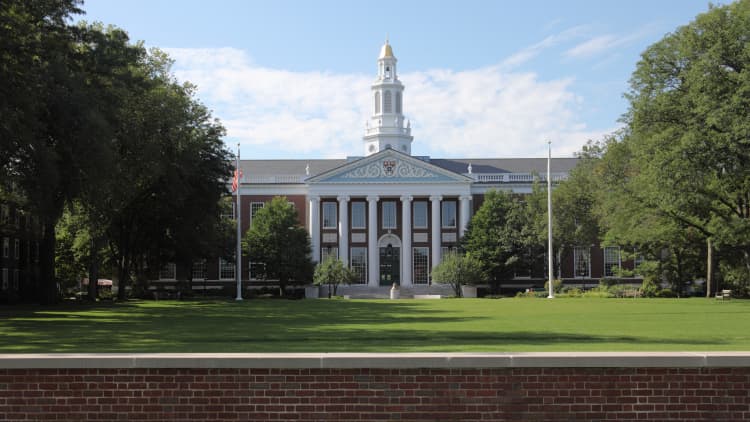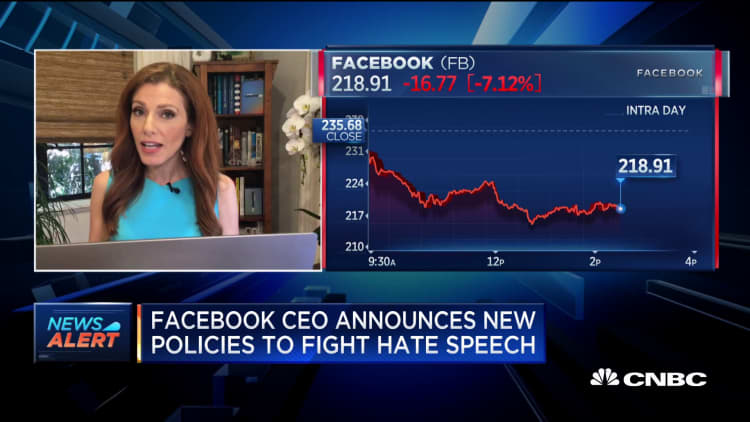A steady stream of companies came out in support of the "#StopHateForProfit" campaign, promising to pause advertising spend on Facebook to encourage the company to amp up efforts against hate speech and disinformation.
With major advertisers like Verizon joining the campaign Thursday and Unilever, Coca-Cola and Honda saying they would pull advertising, Facebook is now facing a snowball effect of advertisers abandoning the site. Starbucks and spirits giant Diageo joined the campaign over the weekend.
But when it comes to Facebook's 8 million advertisers, it may need to be a very big snowball.
Facebook has signaled it intends to do things on its own terms. In a more than 1,600-word memo to advertisers obtained by CNBC, the company's VP of global business solutions, Carolyn Everson, said "boycotting in general is not the way for us to make progress together."
"I also really hope by now you know that we do not make policy changes tied to revenue pressure," Everson said in the memo. "We set our policies based on principles rather than business interests."
Facebook's stock closed down more than 8% Friday.
In the week since a group of organizations called on Facebook advertisers to pause their ad spend during the month of July, more than 100 marketers including Patagonia, REI, Lending Club and The North Face have announced their intention to join, according to a running list from Sleeping Giants. The organizations said they're asking Facebook to more stringently police hate speech and disinformation by taking a number of actions, including creating a "separate moderation pipeline" for users who say they've been targeted because of their race or religion, or to let advertisers see how frequently their ads appeared near to content that was later removed for misinformation or hate, and allow them refunds for those advertisements.
Last year, Facebook brought in $69.7 billion in ad revenue globally through its millions of advertisers. And though some of them command much higher Facebook budgets than others, it would take a large group withholding spend to make much of a financial dent. But the financial dent isn't the end goal, Sleeping Giants said in a tweet Friday: "...It's about a broader reckoning around the platform's lack of moderation of hate and disinformation. Advertisers don't want to sponsor violent, bigoted content or lies."
Facebook CEO Mark Zuckerberg spoke in a livestream Friday, announcing the company will change its policies to prohibit hate speech in its advertisements, but he didn't reference the boycotts directly.
But Color for Change's president Rashad Robinson said in a tweet the address was a "failure to wrestle with the harms FB has caused on our democracy & civil rights."
"If this is the response he's giving to major advertisers withdrawing millions of dollars from the company, we can't trust his leadership," the tweet continued.
Where things could go from here
In a Bank of America note Friday (before Unilever's announcement), analysts noted Verizon had potential to influence other advertisers by joining the boycott. The analysts said channel checks suggest the impact of boycotts "may not be material" since Facebook has so many advertisers in its auction, but that if "key influencers" in other large sectors choose to also join, there is risk of a "nearterm 'snowball' effect." That certainly seems to be the case with Unilever, a major advertiser.
Nevertheless, the Bank of America analysts said they expect tougher restrictions on hate speech "in response to a changing society" and possibly some new policies on fact checking content.
Bernstein analysts said in a note following the Unilever announcement that this is different than the "#deletefacebook" campaign of 2018 after the Cambridge Analytica scandal.
"The current environment is very different," they wrote. "It is very visible who is and isn't participating in the boycott where brand silence [equals] being complicit."
Analysts also said they expected other brands to boycott both Facebook and Twitter platforms and extend the boycott window beyond July, and said Google could also find itself included in the boycotts. (That estimate proved to be prescient; Coca Cola said Friday evening it will be pausing advertising on all social media globally.)
"More brands will follow, and if nothing changes, how can a brand simply turn ad spend back on in August?" they said. "It would be disingenuous. That said, there is also a long bench of advertisers that would gladly take the cheaper ad inventory as it becomes available."
The shakeout could also be a boon for other players. "While many brands were planning on pulling back spend anyways given current macro, a portion of Facebook-allocated dollars may end up on Snapchat, Pinterest, Amazon, Walmart etc."
They wrote that Zuckerberg has been firm in his stance on what he believes to be right, but if enough brands participate, he may begin to question that stance (or could stand firm, and advertisers might still feel the need to return if they start missing their own revenue targets).

Advertisers respond
Many advertisers aren't sated by Facebook's response to the industry thus far.
Goodby, Silverstein & Partners, a major ad agency that's part of Omnicom Group, said earlier this week it's joining the campaign and pledging not to post on its Facebook page, which it uses to promote its work, talk about its people and clients.
"I'm one of the people who feel like the trust has been broken," Co-Chairman and Partner Jeff Goodby told CNBC in an interview Thursday, prior to the Verizon and Unilever announcements. "I'm not sure what they'll do, to tell you the truth. I'm optimistic that they'll listen and do something about it, but experience has shown otherwise."
"As an industry, we talk to them all the time about this," he said. "You can't ask advertisers to invest in this thing with content that comes from everywhere without some assurances that it will be safe for us. There are no assurances. Facebook doesn't even pay attention to its own rules of the road."
Goodby said he expected the movement to get larger. He said to his knowledge none of the agency's clients had joined on as of Thursday morning, but said the agency's intent was to show them informally that it was joining the campaign and that "it would be terrific if they joined us."
"I've heard some hints from bigger brands that they're thinking about it as well," he said. "I wouldn't be surprised to see it get larger."
For now the industry is waiting.
"I'm waiting to see who's going to join us," he said. "I feel like I'm at the end of the diving board and I'm looking back to see if anybody is walking up the ladder."
Barry Lowenthal, CEO of The Media Kitchen, said though Facebook has promised big-dollar investments, the problems have continued.
"It seems like nothing changes," he said. "Misinformation and harmful content is spreading on Facebook and divisiveness in this country continues to rise … by just giving me a 15-point plan, when it seems like things really haven't changed, it really doesn't work."
Lowenthal also said taking a hiatus in July is a different action than in the fourth quarter when brands are trying to drive holiday sales. And he wonders why, if advertisers feel so strongly about leaving, they would return shortly after.
"If it's bad enough for you to leave in July, how do you ever justify going back?" he said.
He said a more meaningful move might be finding alternative channels to shift spend into.
David Jones, the founder of You & Mr. Jones and a founding member of Facebook's client council that sat on the council for four years, said he doesn't feel Facebook is ignoring the advertisers.
"I don't think there's a danger in [that they're] ignoring it and don't take it seriously, but do they actually act on it, and what is the scale of that action?" he said. "There are a lot of things you can do to address this. They cost money."
He said the company comes up with a comprehensive plan to address the criticisms or risk losing relevancy.
"None of the big tech platforms have been able to be the big tech platform a decade later," he said.
-- CNBC's Julia Boorstin and Michael Bloom contributed to this report.



